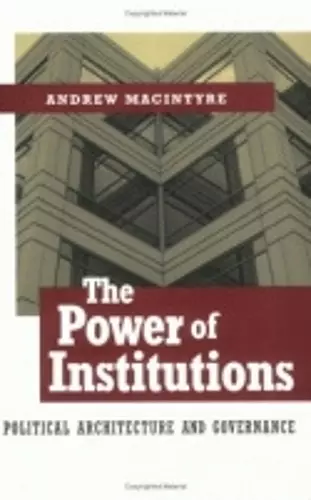The Power of Institutions
Political Architecture and Governance
Format:Paperback
Publisher:Cornell University Press
Published:3rd Dec '02
Currently unavailable, and unfortunately no date known when it will be back

Conventional wisdom holds that "institutions matter." Here, Andrew MacIntyre reveals exactly how they matter in the developing world. Combining an eye for current concerns in international politics with a deep knowledge of Southeast Asia, MacIntyre explores the impact of institutions on effective governance. He examines the "national political architecture"—the complex of rules that determine how leadership of a state is constituted and how state authority is exercised. The Power of Institutions sets out an intriguing conundrum: one well-established body of literature decries the evils of highly centralized political systems, while an equally vigorous school of thought outlines the dangers of political fragmentation.
MacIntyre presents the problems associated with institutional extremes, common in developing countries, as the "power concentration paradox." Either extreme is likely to be associated with distinctive governance problems. MacIntyre illustrates his wider arguments by focusing on Indonesia, Malaysia, the Philippines, and Thailand. He shows how their diverse political architectures influenced their responses to the Asian economic crisis and played into pressures for political reform. The Power of Institutions makes clear why the configuration of political institutions is one of the most pressing challenges in many parts of the developing world today.
Andrew MacIntyre explores what the concentration or dispersal of power within the national political architecture implies for the prevailing pattern of policy management, illustrating with cases from Southeast Asia and generalizing to developing countries.
* Journal of Economic Literature *Political institutions have an important role to play in determining the quality of governance in any country but more so, in developing countries. This much is common knowledge. But what is not apparent is how exactly institutions do matter. The Power of Institutions provides some interesting answers to this question. This remarkably concise book tackles this difficult issue from a comparative perspective.... The book is commendable in terms of its conceptual clarity, neat arguments, uncluttered style and topicality.... The book elegantly combines the concerns of political science with that of area studies. Scholars from both the fields will find this study extremely useful.
-- Kripa Sridharan * Asian Journal of Political ScienISBN: 9780801487996
Dimensions: 216mm x 140mm x 16mm
Weight: 454g
208 pages